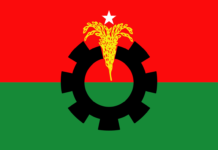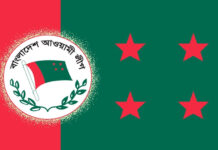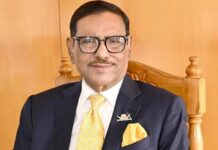Amid the deepening political crisis in the country over the nature of polls-time administration, UN Secretary General Ban Ki-moon on Friday talked to Prime Minister Sheikh Hasina and her arch rival Opposition Leader Khaleda Zia.
In an apparent move by the UN to resolve the country’s ongoing political deadlock, Ban Ki-moon phoned the two top leaders of Bangladesh and discussed various issues, including the next general election that has cast a shadow on the country’s next polls.
UN Secretary General told both the leaders that the global community wants to see a free and fair election in Bangladesh with the participation of all parties.
Ban Ki-moon also said the UN is closely monitoring the political situation and development in Bangladesh.
The UN chief first made the phone call to the Prime Minister in the morning and elaborately discussed the country’s overall political situation.
He lauded Bangladesh’s tremendous successes in the fields of democracy, economic growth and millennium development goals under the leadership of Prime Minister Sheikh Hasina.
“Bangladesh has been acclaimed internationally for its firm stance against terrorism, militancy and fundamentalism,” the UN Secretary General said, adding the world needs a leader like Sheikh Hasina, PM’s Media Adviser Iqbal Sobhan Chowdhury told UNB.
During the 30-minute telephonic conversation that started at 11.30 am, Ban Ki-moon expressed the hope that Bangladesh’s advancement in democracy, economy and anti-militant activities would continue under the leadership of Sheikh Hasina.
Calling upon the opposition to join the next parliament session and place its proposal over the election-time government, Hasina told the UN Secretary General, “We’ll welcome any proposal from them (Opposition) in the next parliament session.”
The Prime Minister informed the UN Secretary General that the government always gives emphasis on dialogues or discussions for resolving any issue.
“That’s why we offer them (Opposition) to engage in a dialogue, but they threw a 48-hour ultimatum instead. They tried to topple the elected government. Later, they destroyed the country’s peace and political stability by resorting to terrorism, anarchy and sabotage,” she told Ban Ki-moon.
Hasina expressed her high hope that the next general election will be held in due time and people will be able to cast their votes freely.
The Prime Minister said the 15th amendment to the constitution was brought following the verdict of the country’s apex court.
However, the Prime Minister addressing a programme reiterated that the next general election would be held as per the constitution to put an end to undemocratic power changeover.
“The next election will have to be held as per the constitution and we’ve to begin the process so that the changeover of power could never happen anymore through any undemocratic way,” she said when leaders of Janmastami Celebration Committee, Bangladesh Puja Udjapan Committee and Hindu religious leaders called on her at her official residence Ganobhaban in the afternoon.
Hours after his telephone conversion with Prime Minister Sheikh Hasina, the UN Secretary General also phoned opposition leader Khaleda Zia and discussed various issues relating to the country’s overall political situation and the and next general election.
Briefing media about the telephone conversation between Khaleda and Ban Ki-moon at the BNP chairperson’s Gulshan office, BNP acting secretary general Mirza Fakhrul Islam Alamgir said the opposition leader told the UN chief that BNP is ready for dialogue over the next general election.
She also categorically told the UN Secretary General that her party will not participate in the general election if it is held under a partisan administration.
Fakhrul said the UN chief also voiced his concern over the prevailing political situation in Bangladesh.
Ban Ki-moon also mentioned with disappointment that his previous initiative for holding a free and fair election with all political parties did not yield any positive outcome.
Source: UNBConnect










